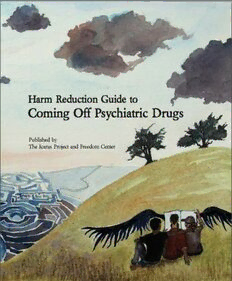
Harm Reduction Guide to Coming Off Psychiatric Drugs PDF
41 Pages·2007·2.284 MB·English
Most books are stored in the elastic cloud where traffic is expensive. For this reason, we have a limit on daily download.
Preview Harm Reduction Guide to Coming Off Psychiatric Drugs
Description:
This 40-page guide gathers the best information we've come across and the most valuable lessons we've learned about reducing and coming off psychiatric medication. Includes information on mood stabilizers, anti-psychotics, anti-depressants, anti-anxiety drugs, risks, benefits, wellness tools, withdrawal, support for people staying on their medications, a detailed Resource section, and much more.The guide is published by The Icarus Project and Freedom Center, two mental health peer support communities that bring together people diagnosed with bipolar, schizophrenia, depression, borderline, anxiety and other psychiatric labels seeking options beyond mainstream dominance by doctors and pharmaceutical companies. It emphasizes years of direct personal experience with medications and the experiences of madness they are prescribed to treat, as well as extensive, state-of-the-art research that goes far beyond the usual pharmaceutical and mainstream medical perspectives.The guide was written by Freedom Center co-founder and Icarus Project staff Will Hall, with a 14-member health professional Advisory Board comprised of medical doctors, nurses, psychologists and acupuncturists providing research guidance. More than 20 other collaborators from the survivor movement in several countries were involved in developing and editing, and key research sources include the UK charity MIND and the British Psychological Society. There are photographs and art throughout, and a beautiful original cover painting by Ashley McNamara.Based in harm reduction philosophy, the guide emphasizes personal choice and weighing risks and benefits for each individual. It offers non-judgmental support to people continuing to take medication or lowering their dosage, as well as people exploring coming off. The risks associated with psychiatric medication are discussed along with risks of emotional distress and mental health crisis, and the role of economic privilege in access to treatment options is challenged. Years of advocacy at the Freedom Center and Icarus Project have proven the effectiveness of this approach, which is neither pro-medication nor anti-medication, but instead provides accurate information and promotes choices and alternatives.
See more
The list of books you might like
Most books are stored in the elastic cloud where traffic is expensive. For this reason, we have a limit on daily download.
